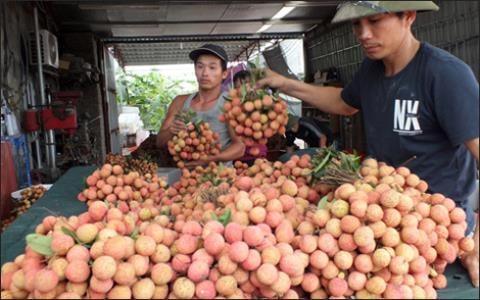There is an "escape" door from China, Vietnamese agricultural products should not be just "skimmed"
If 5 cases of violations of food safety and plant quarantine regulations are detected within 1 year, the EU will issue a ban on importing Vietnamese fruits and vegetables.
The European Directorate General for Health and Consumer Affairs (DG SANCO) with such an "ultimatum" warns Vietnamese fruit exports.
Challenges of Vietnamese agricultural products
The European Market Department, Ministry of Industry and Trade, said that since February 1, 2014, the European Commission's Directorate General for Health and Consumer Affairs (DG SANCO) has been notified three times in a row by EU member states that three shipments imported from Vietnam to the EU were found to contain bacteria harmful to consumer health and banned on basil and bitter melon.
 |
| In the near future, Vietnam can export about 600 tons of lychee to the US each year. |
This happened when DG SANCO had previously announced that if within 1 year from February 1, 2014 to February 1, 2015, 5 cases of violations of food safety and plant quarantine regulations were discovered, the EU would issue a ban on the import of Vietnamese fruits and vegetables.
"If this ban happens, not only will Vietnamese vegetables, fruits and goods not be able to be exported to EU countries, but the reputation of Vietnamese agricultural products and goods in the international market will be seriously affected," warned the European Market Department, Ministry of Industry and Trade.
Meanwhile, the US has also just accepted labels and fabrics into its market with strict binding standards.
What should Vietnam do?
Talking to us, Professor Vo Tong Xuan said: "The Ministry of Agriculture and Rural Development, with its management responsibility, must strictly control shipments and strictly inspect quality, not to let Vietnamese goods be known, and the risk of losing customers is possible."
The opportunity to expand the export market has come, but if we rest on our laurels for just a minute, relax inspection, supervision and remind growers, we will make things difficult for ourselves." Professor Vo Tong Xuan |
According to Professor Vo Tong Xuan, it is not by chance that the US Department of Agriculture has accepted two more fruits, longan and lychee, into their market after rambutan and dragon fruit. That means these products have met the requirements of quality and food safety. Initially, it is expected that Vietnam can export to the US about 600 tons of lychee and 1,200 tons of longan per year.
However, this is not a simple story that can be told once and then left alone. It always requires effort, long-term assurance, and proper steps throughout the product's life cycle.
"The opportunity to expand the export market has come, but if we rest on our laurels for just a minute, relax inspection, supervision and remind growers, we will make things difficult for ourselves," said Professor Xuan.
Unlike the normal market, if the US makes a mistake, they will impose very harsh sanctions. Professor Vo Tong Xuan said that there was a company that exported fish to this market, and because the fish had a bad smell, they asked the company to pay money to destroy the entire shipment.
"After that, our company begged them to let us pay the fine and then bring the goods back to the country. They accepted it, but if we had to pay to destroy the entire shipment, the cost would have been much higher," said Professor Xuan.
"Therefore, if we want to maintain the market, there is no other way but to continue following the procedures they require and the conditions they impose on us, and we cannot do it in a quick-fix manner," Professor Xuan warned.
He also noted that to avoid the situation of businesses dumping prices, the management agency should establish an association to manage and regulate each price level with corresponding quality. Encourage businesses to be unanimous. The Ministry of Industry and Trade must also closely monitor from the beginning to manage prices.
"It is necessary to clearly assign responsibilities so that Vietnamese agricultural products can gradually build a brand that can compete not only with the international market but also with the domestic market, which is a fierce battle. More importantly, it must be done systematically and systematically to avoid the situation where businesses 'skim the cream' when there is profit, but when there are difficulties, farmers have to bear the brunt. The lesson of rice is still there!", Professor Xuan suggested.
According to vtc.vn






